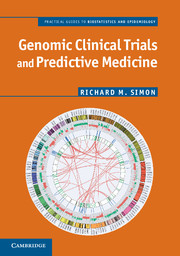Book contents
- Frontmatter
- Contents
- Acknowledgments
- Introduction
- 1 Clinical Trial Basics
- 2 Actionable Prognostic Biomarkers
- 3 Phase II Designs
- 4 Enrichment Designs
- 5 Including Both Test-Positive and Test-Negative Patients
- 6 Adaptive Threshold Design
- 7 Multiple Predictive Biomarkers
- 8 Prospective–Retrospective Design
- Appendix A Statistics Background
- Appendix B Prognostic Classifiers Based on High-Dimensional Data
- References
- Index
3 - Phase II Designs
Published online by Cambridge University Press: 05 February 2013
- Frontmatter
- Contents
- Acknowledgments
- Introduction
- 1 Clinical Trial Basics
- 2 Actionable Prognostic Biomarkers
- 3 Phase II Designs
- 4 Enrichment Designs
- 5 Including Both Test-Positive and Test-Negative Patients
- 6 Adaptive Threshold Design
- 7 Multiple Predictive Biomarkers
- 8 Prospective–Retrospective Design
- Appendix A Statistics Background
- Appendix B Prognostic Classifiers Based on High-Dimensional Data
- References
- Index
Summary
The purpose of a phase II clinical trial of a treatment regimen is generally to determine whether the regimen is sufficiently promising to warrant a phase III evaluation and to optimize the regimen and the target population for use in the phase III trial. The objective of optimizing the target population takes on great importance in developing molecularly targeted treatments for biologically heterogeneous diseases. Molecularly targeted treatments often aim to treat the underlying disease mechanism, not the secondary symptoms. Such treatments are generally not expected to be broadly effective for biologically heterogeneous diseases. The phase II studies should evaluate the candidate predictive biomarkers for the one that identifies the best candidates for the new treatment.
For oncology drugs that are specific for a known molecular target, the predictive biomarker candidates have often been measures of overexpression of the target protein in the tumor cells or mutation or amplification of the associated gene. Oncology phase II trials generally use intermediate end-points such as tumor response or progression-free survival. The biomarker candidates can be evaluated in randomized phase II trials to maximize the new-treatment-versus-control-treatment difference, although this may require much larger sample size than is typical for phase II trials. In many phase II oncology clinical trials, tumor response is used as the end-point in a single-arm design and the candidate biomarkers evaluated to maximize the response rate. Although this approach may identify a subset of patients who respond better to both the new treatment and the control, it is a satisfactory approach if one is trying to find a subset of patients who have a nonnegligible response rate to the new treatment.
- Type
- Chapter
- Information
- Genomic Clinical Trials and Predictive Medicine , pp. 25 - 34Publisher: Cambridge University PressPrint publication year: 2013



